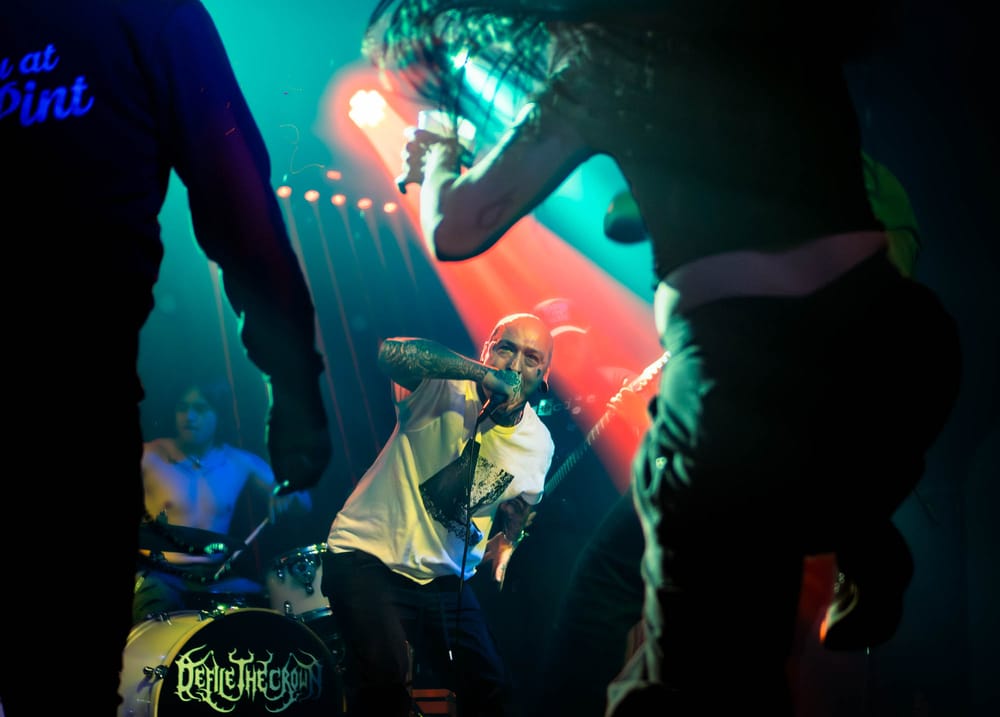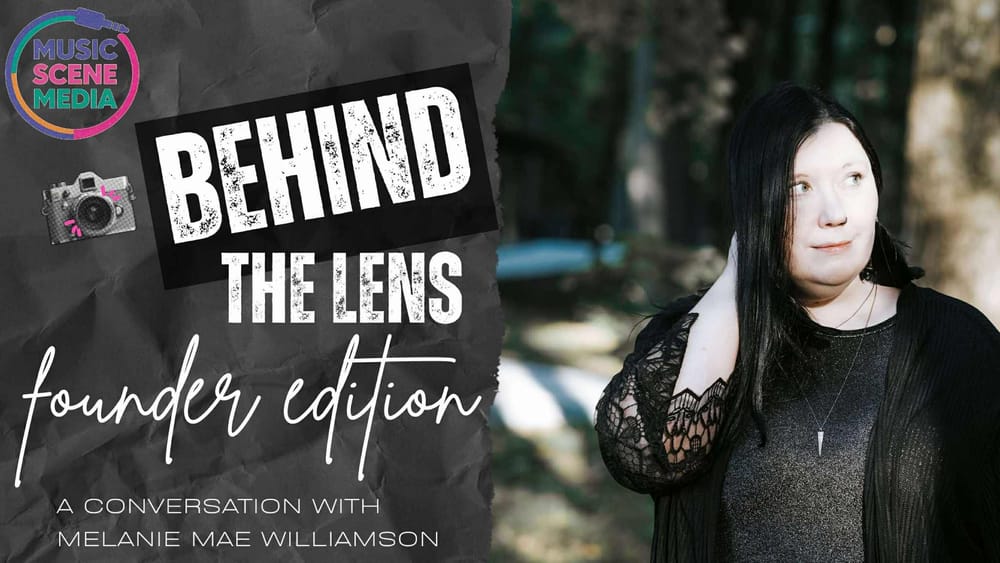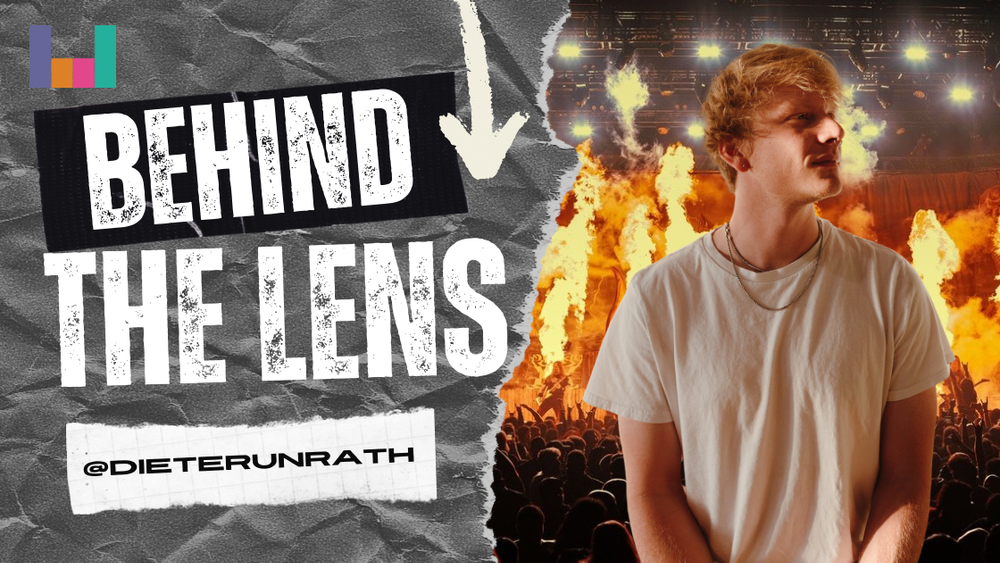For many bands, especially independent DIY artists, navigating the world of music PR can be a bit overwhelming.
Have you ever wondered how to get your music and your brand to stand out in an increasingly oversaturated industry? And, most importantly, what does a publicist even do, and why do you need one, anyway?
I recently sat down with Amy Sciarretto, otherwise known as the head of the one and only Atomsplitter PR. If you’re somehow unfamiliar, think of Atomsplitter as the behemoth of rock and metal publicity—no exaggeration. Bands like Falling In Reverse, Killswitch Engage, Dayseeker, Alice Cooper, Beartooth, and many more all trust Amy with their brand. So, who better to discuss the music industry with than the Queen of the Scene herself?
Whether you’re gearing up for your first release or trying to take your career to the next level, this is the advice that you didn’t know you needed.
MSM: First of all, what exactly does a publicist do? How does that differ from a manager or a booking agent?
Amy: People don't always understand the delineations — a manager is the traffic cop, the hub operator. They're the nerve center for all of the other tentacles attached to a band, which includes publicity, marketing, radio, social media, and touring. Publicity is the tentacle that ensures that media is talking about your band, are aware of your band, are in the know, are checking out the music, are attending the shows, and are writing about it, so that fans and the public, too, become aware. But also, public relations is the tree, and publicity is like a branch. Interviews are also a branch of that tree. The interviews you do and that you don't do are also branches of the public relations tree.
Being a publicist is basically cultivating, curating, protecting, and building an artist's public image. And I don't mean dealing with your adoring public and your fans; it is the public image that is fostered or grown via the media. It's your public profile in the media. So it's also the interviews you don't do. It's the stories that you make sure don't get printed. It's the fixing of any issues or potential imaging and perception problems that inevitably happen. It's the crisis management, it's the getting tastemakers or influencers out there to see you, it's going to the next level. It's all those things. It's not just the interviews and the photo shoots; it's also what you don't do. It's deciding at the top of a campaign, what are we going to do, and what are we not going to do? What's going to be new this time? What are our tentpoles? What are the pinnacle pieces of press that we want or hope to and will fight to get? What are we not going to do? How are we going to achieve these goals? How are we going to tell the story of this album and this phase of the band's career this time out? So, that's what a publicist does. They tell your story from 360 angles. You can speak into a vacuum on social media, and your followers are going to see and find that, and you're going to speak to those who are ALREADY your followers. What publicity does is get you that third-party validation, that tastemaker, that media outlet, that blogger, that person who says the music is good, and that other people listen to. Those who are not ALREADY there. The publicist's job is to get it in front of those types of people because you can't live in a vacuum and just speak to the people who are already fans. You're just going to always have people who are already fans, and publicity helps you find new fans and supporters. It's something that has to be done for everything. I always tell people that EVERYTHING needs PR, and it's a skill that can be applied across the board—to music, books, bakeries, porn, everything in between, even hair dryers—even Dyson air dryers have a publicity team. And it's just people out there telling your story in a 360-degree way, telling it to all facets of media.
MSM: Is there a “right time” for a band to start working with a publicist? Are there signs that it’s too early—or too late?
Amy: It's never too late because you're always going to need somebody that's going to either fix something or tell your story or start telling it because it hasn't been told yet. Yes, though, I do believe it can be too early. Sometimes, bands are not ready for publicity. If you've never played a live show and you only have one song and you don't have an album, or you don't have a story or a plan, or you don't have an angle, you're not ready for publicity and the surrounding machine of publicity. You're not ready to be pitched because you have to have a fully realized and actualized story to tell people. And if you've not toured or you've not done anything that's worth talking about yet, if you've not done or put in the work, if you've not put in the grind, if you've not hustled, if you've not played the dive bars to two people for six months straight, if you've not done any of that yet, it's really hard to get people's attention. So you have to do some of that work on your own. And when you are ready to english a publicist, there needs to be a lot to for THEM to talk about. Sometimes you need to put in that elbow grease first before you spend the money on something at which you don't always get two chances or two bites of the apple.
MSM: What makes an artist stand out as someone whose story you really want to tell?
Amy: Well, first of all, some people write to me and are like, “Hey, we have a band.” Great. Send me a link to some songs. Don't send me a 25 MB attachment, but send me a link to the songs, a photo, a short story, and tell me about yourself. Present yourself; sell yourself. Our roster is really very competitive, and we work with some of the best and biggest bands in rock music, proudly so. And to get our attention, you've got to do something attention-worthy. I get 100-150 emails an hour, and I'm up to well over a thousand emails a day. And I tell people, if you want to get read, you've got to be readable. Make it stand out. I think a professional email with somebody who has professional links that speaks professionally, that just isn't, like, “Yeah, my band has a record coming out next week, and we want to work with you.” Well, that presumes that we have availability, or it presumes that it doesn't take weeks of setup and preparation in order to do that. I think professionalism, consideration of what you're getting yourself into, and understanding what publicity is before doing that first email outreach to a publicist… because some people don't. They think, 'Oh, a publicist is just going to get me on the cover of Rolling Stone.' Well, that's just not realistic. Having some idea of what publicity is as a broad stroke or even just asking that question. So, I just think professionalism is really good, and a nice, clean email with links where I can check key pieces out, like music, a bio, and a photo.
MSM: Is there ever a time when a band should walk away from a publicist—or red flags they should look for?
Amy: Yes. I think I'm very lucky that most of our bands have been with us for a really, really long time because we just understand each other. We get each other. We've been in the shit together for so long. We try to keep the publicity machine interesting for them by doing new things and bringing in new looks and keeping them excited about doing interviews. But yes, I do think that if you're talking to a publicist and they say, “Oh, I guarantee I can get you that in a heartbeat,” nothing is guaranteed in publicity. The landscape changes every day, and if anybody promises you a guarantee or says, “Oh, you have a publicist right now, and they're not getting you that? Oh, I can get you that easily. Fire them and hire me.” That's not really believable because when you hire a publicist, none of us, at least the good ones, are going to be like, 'Yeah, yeah, we will get you this,' and then do nothing. We're out there grinding. Every. Single. Hour. Of. Every. Single. Day.
If we're not getting a response on something we think is awesome, then we recalibrate and say, Let's try a different strategy. Let's try a different tactic. Let's try a different approach. And if we're still not getting an answer, then there's something wrong, but nothing is unfixable. We have to figure out why this is not connecting and calibrate. Maybe we love it and the press just doesn't, or maybe the press isn't ready for it. So if anybody says, 'Oh, you have a publicist; they're not getting you anything,. They must not be doing anything.' That's just the farthest thing from the truth. No good publicist that wants to stay in business is going to take your money and then not deliver or have proof of, like, the thousand people they reached out to and didn't get a good response. Something isn't connecting. Let's either recalibrate or figure it out. And sometimes you can think a band or release is awesome as fuck, and then the press just doesn't share your feeling for it. And that always sucks. Sometimes you'll just have to work to find the audience. Every PR plan we do is customized to that artist. No cut and paste over here! And I always say, there's somebody out there who's going to like this. It's our job to find it and get it in front of the people who are going to like this. And sometimes that requires a lot of canvassing and finding new people and going out there and looking at similar bands and saying, All right, who's covering them? Okay, let's go after this person. Publicity is a lot of legwork. It's always about getting creative and sometimes finding a way to get a yes when you've already gotten a no. And it's just not that you're not taking no for an answer; you're just finding a way to get creative to try to get the answer you want.
MSM: What advice do you have for bands who can’t afford a publicist yet—how can they start building buzz on their own? And are there any common mistakes bands make when trying to do their own PR?
Amy: Yes. If you can't afford a publicist or aren't ready, you can advocate for yourself up until a point, because at some point, you're going to have to just go be a band and let the people who take care of band things take care of band things so you can perform, write music, and record it, and focus on THE ART. But when you're not at that phase yet, then you've just got to grind it. You've got to make friends with your local radio stations, whether it's college or commercial, or the guy who hosts the two-hour rock specialty show at two in the morning. You make friends with anybody who's got a local YouTube channel, anybody who's got a local blog, or a local zine; make friends, go to the local dive bar, offer to play, offer to open, offer to play free. You've got to get out there and create a buzz in your local market first. And that really is as easy as just making friends with the college radio station music director or the specialty show in the commercial station or just the local guy who's got a blog he crafts from his basement. You just have to get out there and befriend those people and come up together. They may only have a hundred, 200, or 300 followers in the market, but that's 200-300 people who never heard of you, so become friends with them and do the things that just get you connected with them, and then you guys can grow together in the local market, and then you're going to have a supporter for life.
That's how I look at it, as long as they're doing what they're doing. So it's always, always really smart to be friends with the local bookers and the local venues—if there's a VFW Hall that puts on shows, approach the promoter, go there, ask to find the person who books the room, and ask to get on a show. That's how you create the local buzz. If you're not doing that hyper-local work in the location where you're at all the time, if you're not doing that work, then how are you going to do that on a national level? If you don't super serve your local market, why would the national market care? So that's really important. And any mistakes that I've seen are just bands that sometimes don't put the work into those resources. There are blogs, there are websites, there are print magazines, and there are newspapers in every market, and if you're not trying to connect with those people who are there, where you live, in sharing that community with you, then it's a very big missed opportunity, and it doesn't show that you are any kind of self-starter.
MSM: Are there any newer platforms or strategies that you think bands should be paying more attention to?
Amy: I just think it's really good to update your socials, but don't overdo it. And also be careful with what you post, because it's screenshotted before you even have a chance to even post it, much less delete it. The Internet is forever, so always be careful what you're putting out there. Try to curate what your posts are on your socials to have some kind of continuity in terms of the aesthetic or the time that you post, what you post on, and how you post it. That's what I recommend bands do. TikTok is a very “here today, gone tomorrow” type of platform, but there are a lot of people on it, so you just have to sometimes make sure that when you're putting stuff up there, it's of value. I used to say, do we really care what our favorite fans are eating for lunch? You know what I mean? Yes. It makes you feel like you're seeing them, but also you can see that in a magazine article or a blog interview where you're getting a little bit more of a not quite, so, okay, this is directly from the band, but it really isn't. You've got somebody who's sitting in front of the band asking questions, getting them thinking; that's the kind of stuff that I recommend. But yeah, just a lot of the social platforms are really, really where you can connect with a wider subset of potential fans.
MSM: Who has been one of your favorite artists to work with, and is there any particular reason why?
Amy: Oh God, so many of them. I mean, I'm so blessed. I love all of our artists. I worked with Sleep Token for many, many years when nobody knew who they were or cared, and it was hard because he doesn't do interviews, so we just had to learn how to get people to connect those dots, and now look at where he is today. It's a once-in-a-lifetime, once-in-a-generation artist, and it was just a matter of getting really creative to get people to cover it. He doesn't do interviews, so it was like, how do we get him on the cover of a magazine when he's doing all this amazing stuff without him speaking? Okay, so it's giving somebody an exclusive look at new tour attire. We're working with this artist, President, who's very similar to Sleep Token, and it was just a matter of watching the buzz grow and how we connect the dots with people and have people see that this is different than Sleep Token and what matters with it, which is it's investing in the cult of personality and building a community and an aesthetic. It has a really specific point of view, which I think people are connecting with, and it's amazing to watch. We have this young band, Chained Saint, who started out as just a bunch of kids who loved playing music, and it was like when we got with them, it was Ground Zero, and now they're on their first headline tour, and we helped them grow to where they are, and they're going to just keep growing. We are just lucky. We worked with them, just seeing them go from a band that started in having seen beginnings to growing into this big monster of its own. We worked with The Pretty Reckless, and it's seeing Taylor Momsen just embrace her love of Soundgarden, and the media loving her love of Soundgarden, and sharing that love with her. So, Bloodywood is a band we work with, and just seeing how cultures collide in their music and how they're doing something that's so unique and just seeing people truly connect with that is pretty amazing.



